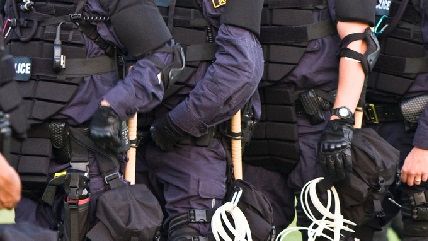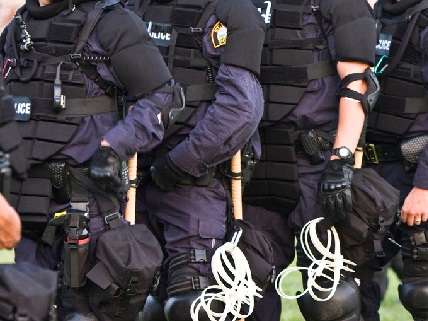Louisiana to Become First State to Make Cop Killing a Hate Crime
Democratic governor expected to sign the widely-supported legislation.


In Louisiana, a bill passed by the legislature that would extend hate crimes protections to police officers and first responders is expected to be signed by the governor, John Bel Edwards (D), as early as this week, the Washington Post reports.
The bill (H 953) passed the House unanimously and passed the state Senate 33-3. Dubbed the "blue lives matter" bill, its supporters say it's needed in the wake of high-profile shootings of police officers.
Its sponsor, Rep. John Lance Harris (R-District 25), says he introduced it after the shooting of a Texas sheriff's deputy last year. "If you're going to have an extensive hate crime statute then we need to protect those that are out there protecting us on a daily basis," Harris told CNN. "There is a concerted effort in some areas to terrorize and attack police and I think this will go forward and stop that."
Killings of police officers were down in 2015. There were 42 fatal shootings of police officers in 2015, according to data from the National Law Enforcement Officers Memorial Fund, and 49 in 2014. That's higher than 2013's 33 officers fatally shot, but still down about 50 percent from the 10-year high hit in 2011 of 73 (that year, police officers in Los Angeles County alone shot and killed 54 people).
As I've written before, the difference in reactions to police killings in 2011 and police killings in the last two years can be attributed to the issue of police reform getting broad national attention. There was no police reform movement in 2011 to malign by exploiting the killing of police officers, so there was no need for a "Blue Lives Matter" campaign. The present one is misguided—individuals who kill cops are generally caught and punished. There is no systemic effort to protect cop killers from penalties the way there appears to be one to protect killer cops—from the lack of independent investigations to the privileges for police officers embedded in state laws (like the Law Enforcement Officers' Bill of Rights) or through police contracts.
A federal "Blue Lives Matter Act" extending hate crime protections to police officers was also introduced this year, and presumptive Republican presidential nominee Donald Trump is pushing for killing a cop to be a federal capital felony.
It should be unsurprising that hate crime laws would be expanded to protect professional classes like law enforcement officers. After all, although Louisiana's law will be the first to respond to cop killings by enhancing sentences using hate crime laws, many states do have enhanced penalties for cop killings anyway. Once a new avenue for creating a protected class was opened, perhaps it was inevitable government would use it to protect its own. It's what government does.
Critics of the Louisiana bill, like the New Orleans chapter of the Black Youth Project 100, say it's a violation of their First Amendment rights. "By treating the police as specialized citizens held above criticism and the laws they are charged to enforce," the project said in a statement, "we lose our ability to exercise our First Amendment right." Opponents of hate crime laws have long argued they violate the First Amendment by punishing what people say, think, and believe, and not just their criminal acts.


Show Comments (49)